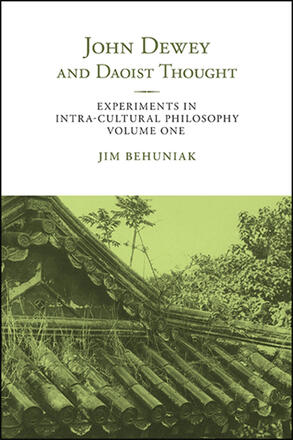
John Dewey and Daoist Thought
Experiments in Intra-cultural Philosophy, Volume One
Alternative formats available from:
Proposes an “intra-cultural philosophy” based on John Dewey’s “cultural turn” and promotes Daoist thought as a resource that can help to reconstruct outmoded assumptions that continue to shape how we currently think.
Description
In this timely and original work, Dewey's late-period "cultural turn" is recovered and "intra-cultural philosophy" proposed as its next logical step—a step beyond what is commonly known as comparative philosophy. The first of two volumes, John Dewey and Daoist Thought argues that early Chinese thought is poised to join forces with Dewey in meeting our most urgent cultural needs: namely, helping us to correct our outdated Greek-medieval assumptions, especially where these result in pre-Darwinian inferences about the world.
Relying on the latest research in both Chinese and American philosophies, Jim Behuniak establishes "specific philosophical relationships" between Dewey's ideas and early Daoist thought, suggesting how, together, they can assist us in getting our thinking "back in gear" with the world as it is currently known through the biological, physical, and cognitive sciences. Topics covered include the organization of organic form, teleology, cosmology, knowledge, the body, and technolog—thus engaging Dewey with themes generally associated with Daoist thought. Volume one works to establish "Chinese natural philosophy" as an empirical framework in which to consider cultural-level phenomena in volume two.
Jim Behuniak is Professor of Philosophy at Colby College. He is the author of John Dewey and Confucian Thought: Experiments in Intra-cultural Philosophy, Volume Two and Mencius on Becoming Human, both also published by SUNY Press.
Reviews
"With this two-volume set, Behuniak has produced an exemplary work of intra-cultural philosophy. The dynamic interplay between Dewey's and Confucian/Daoist philosophies percolates spiritedly in its pages, the contemporary relevance of the exchange never in doubt. Behuniak's meticulous scholarship leaves no stone unturned, while his incisive analyses offer critical and productive contributions to ongoing dialogues. There is much to be gained from this book; I would recommend it highly to anyone." — Mathew A. Foust, Reading Religion
"As the first piece of an over 800 pages scholarly undertaking, this volume provides more than a mere glance into the workings of philosophy's fictional two poles: the western and the eastern. It creates a momentum: a momentum of joyful reading that propels the enthusiasts of either culture to get into the second volume of the set, as soon as they put down the first one." — Religious Studies Review
"Moving beyond the limits of comparative philosophy, Behuniak's intra-cultural approach refuses to separate past and present or to separate various philosophical traditions into self-enclosed compartments. Such an approach has been a long time coming. Like a good Platonic dialogue, these volumes place important traditions into conversations that enhance thinking about today's issues. In terms of depth and thoroughness, the scope of learning in both American and Chinese philosophies is breathtaking." — Raymond Boisvert, Professor Emeritus of Philosophy, Siena College